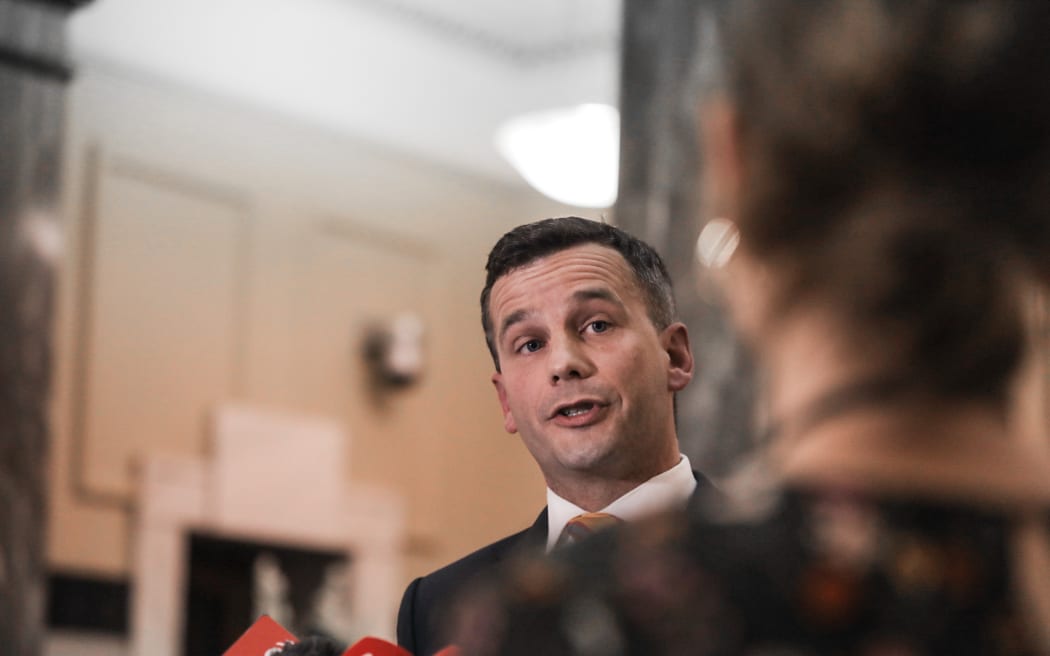Education Minister Jan Tinetti and Finance Minister Grant Robertson today announced additional funding for universities and tertiary institutions (file image).
Photo: RNZ / Richard Tindiller
Opposition parties largely support the government’s decision to pump an extra $128 million into tertiary education, but say it shows things need to change.
National and ACT argue the funding would not have been needed if they were in power, while the Greens say the funding system is long overdue for an overhaul.
The government announced the funding on Tuesday afternoon, following recent proposals by Victoria University of Wellington and the University of Otago to cut large-scale jobs, with entire subjects at risk.
The government also announced plans for a comprehensive review of tertiary education funding, although its terms of reference are not expected to be presented to Cabinet until December, after the October election.
Opposition Leader Christopher Luxon backed the government’s funding, saying it was necessary but would not have been necessary if National were in power.
“We don’t want our universities to break,” he said. “I think we have no choice but to make sure our universities don’t go bankrupt and we have to support our universities.”
“Frankly, we wouldn’t be here if we had a national government because we would have got the international student section back much quicker, we wouldn’t have spent an endless amount of wasted time on a mega polytechnic merger and, frankly, we would have made sure that more than 50 per cent of our children are not failing our university entrance exam.
“First, we would manage inflation downward.”
He said it showed “gross incompetence” on the part of the government.
“It has been an unmitigated disaster for the last six years and there is one person at the helm [of education] for the last five and a half years, it’s been Chris Hipkins.”
He had not had a chance to study the review the government had announced, he said, and had no opinion on whether it was too slow.
He refused to outline yet what National would do for universities if in government.
“We will have more to say about this with our education policy before the election,” he said.
ACT leader David Seymour took a similar approach, saying the funding was only needed because of mismanagement.
“Yes, it is necessary to keep the universities, of course it is. We have to ask how we got here: closing the borders for too long when there were easier options available, funding the fee-free tertiary that has not. it has increased participation, but it has effectively paid off the student loans of mostly affluent citizens.”
David Seymour, Leader of the ACT
Photo: RNZ / Samuel Rillstone
Seymour was also more willing to pass judgment on the universities’ financial arrangements than Luxon.
“Universities need to streamline,” he said. “There are too many departments in too many subjects in too many universities for the size of the country. Universities need the flexibility to make sure we have a few centers of excellence in each subject.”
Green Party tertiary education spokeswoman Chloe Swarbrick welcomed the extra funding but suggested the review was what really mattered.
“The funding model for our universities is fundamentally broken, and that’s what needs to be focused on,” he said.
“I’m very proud to have worked with the Tertiary Education Union, with the students’ associations and with the minister to make this happen, but it’s a plaster, a Band-Aid for what is needed which are long-term structural solutions .
Green Party Tertiary Education Spokesperson Chloe Swarbrick.
Photo: RNZ / Samuel Rillstone
“The review has also been very long, so I’m glad to see the government committing to that. What we need to see now are the terms of reference.
“In that sense, I would say it’s been incredibly frustrating over the last few years to constantly be on a select committee talking to the [Tertiary Education Commission] i [Ministry of Education] and asking them about the students. They always say there’s no problem because they don’t have the data to show it because they’re not collecting that data, so we want to see students front and center in this research.”
He said part of the problem with university funding was declining student enrolment, and poverty and hardship played a role.
“Perhaps we need to ask why students are not enrolling in tertiary education in the first place,” he said. “What we’re hearing very clearly, as evidenced in our student inquiry last year, is that two-thirds of students regularly can’t afford the basics.”
The Maori Party has been approached for comment.
[ad_2]
Source link







